How to Choose a SaaS Development Company?

Key takeaways
- So, what exactly is a SaaS company? Get the answer to this question in our article.
- Find out how the selection of the SaaS development company can affect the successful product creation SaaS application development company.
- Learn how a systematic approach can help you find the perfect SaaS development service provider.
- Compare the benefits of onshoring and offshoring to make an informed decision.
- Get tips and insights on what steps to take before contacting a SaaS provider.
- Discover questions to ask your potential provider to see exactly if you’re a good match.
- How to evaluate the vendor’s work methodology and project management approach? Get helpful information for assessing these factors.
- Figure out how to evaluate a SaaS company based on its business-oriented approach to achieving your goals.
With thousands of IT vendors that specialize in the development of SaaS solutions for businesses choosing the right one to develop your project can be an overwhelming task. However, rest assured that we are here to help you make an informed choice and easily stand out among the other 30,000 SaaS companies.
In this article, we will guide you by providing the essential information and factors to consider when choosing a reliable SaaS development company. From understanding the project requirements to assessing their experience and project management capabilities, we will reveal how to determine whether a company is the right fit for your project. Let’s navigate the sea of options together and find the efficient approach to finding a perfect SaaS development partner.
What is a SaaS company?
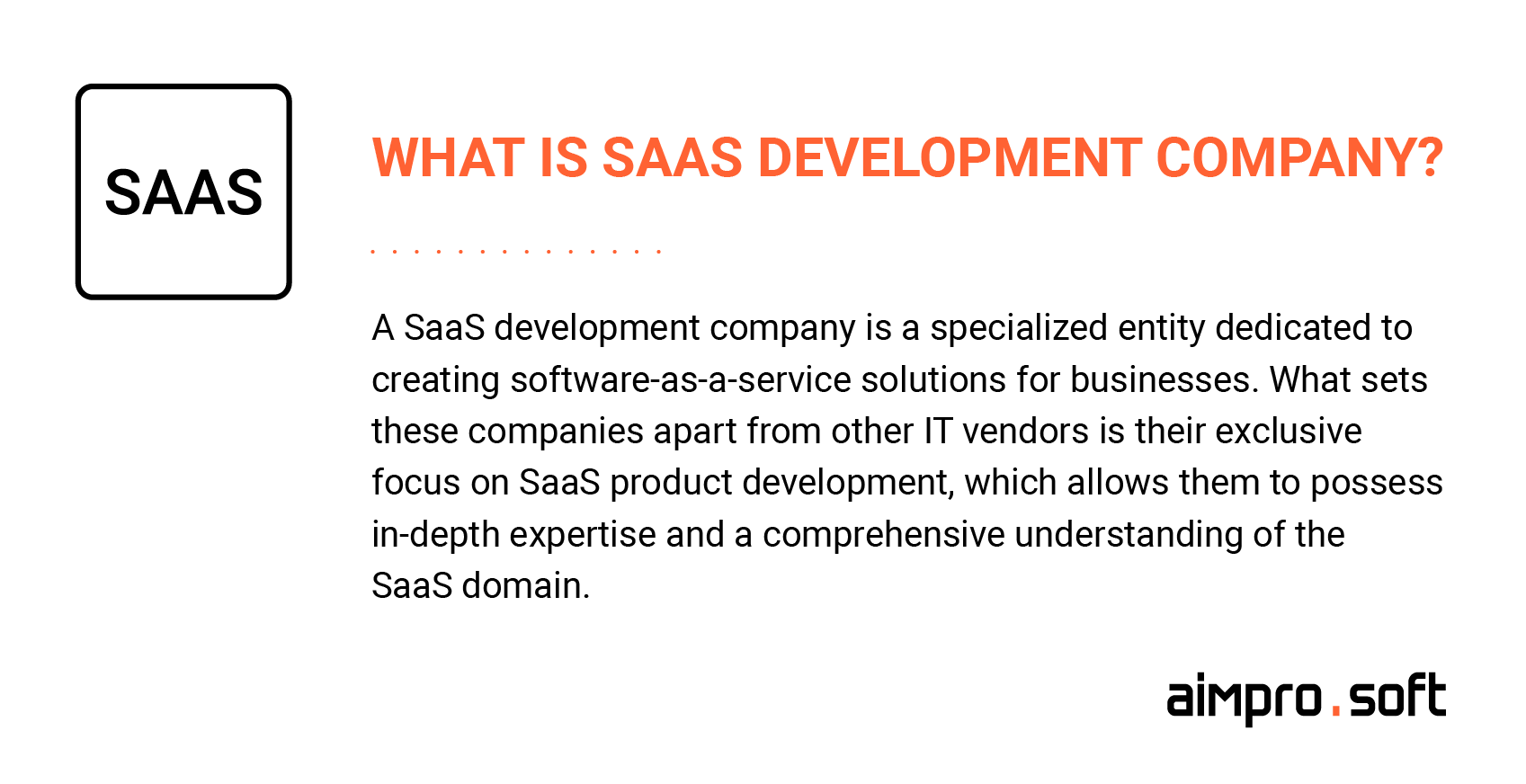
What is SaaS development company?
By concentrating solely or primarily on SaaS development, these companies stay at the forefront of industry trends, adopting the latest technologies, tools, and methodologies to deliver cutting-edge solutions. This specialization enables them to provide valuable insights and strategic guidance to clients, assisting them in harnessing the full potential of their SaaS products in the competitive market.
Ultimately, a SaaS development company’s focused expertise, technical prowess, and dedication to SaaS solutions set them apart as trusted partners in transforming innovative ideas into successful, market-ready SaaS products.
Path to success: why does choosing the right SaaS development company matter?
When it comes to developing such a complex product as SaaS solution, choosing the right development company is of paramount importance since the choice can significantly impact your SaaS project’s success. In this section, we will look at what is saas development company’s specifics and why choosing a SaaS company meticulously matters, and how collaboration with an experienced SaaS vendor can lead you to a robust, scalable, and successful SaaS solution.
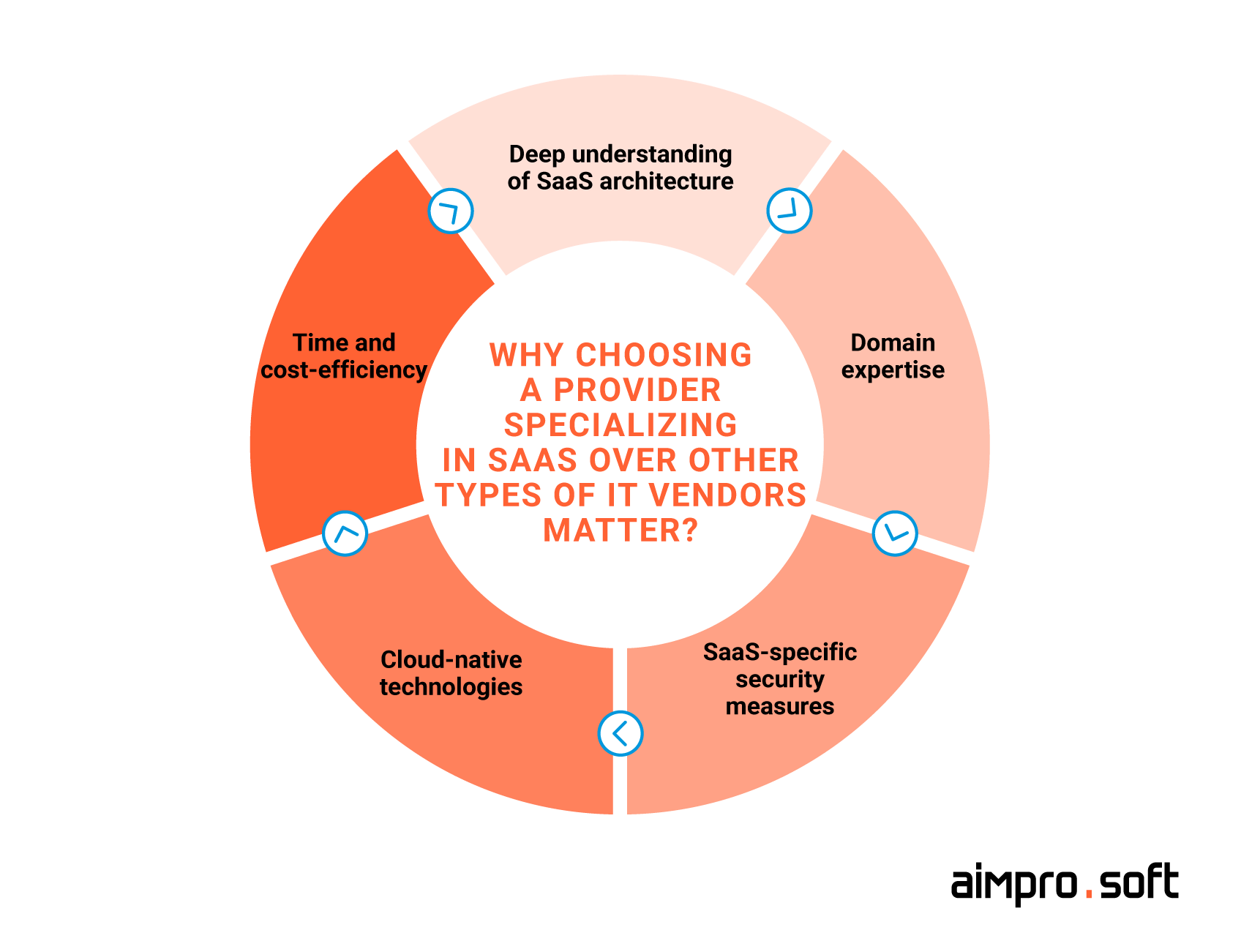
Why choosing a SaaS provider over other IT vendors matter?
1. Deep understanding of SaaS architecture
SaaS companies understand precisely the underlying architecture and infrastructure required to build a successful SaaS product. They specialize in multi-tenancy, API integration, and monitoring/analytics in the context of SaaS applications. T This expertise is crucial for building highly performant, scalable, and resilient SaaS solutions.
2. Domain expertise
SaaS application development companies have subject matter expertise, meaning they specialize in developing SaaS applications for specific industries or niches. This expertise means they know your industry’s unique requirements, regulations, and workflows inside out, resulting in building customized and effective SaaS solutions.
3. SaaS-specific security measures
In a SaaS model, security is paramount as multiple tenants share the same infrastructure. SaaS companies understand the security challenges inherent in multi-tenant environments. They employ robust security measures such as data encryption, role-based access control, and regular security audits to protect data and ensure compliance with industry standards. For example, a SaaS vendor may use an automated security measure called SaaS security posture management (SSPM) to keep track of the security threats associated with SaaS applications.
SSPM blocks unintentional vulnerabilities that arise during the development process. A single level of visibility over the whole cloud environment is offered by SSPM. As a result, the reputable SaaS vendor armed with a deep understanding of SaaS security-related challenges and best practices to overcome them can deliver a robust and secure solution that won’t jeopardize your business because of non-compliance, security breaches, etc.
4. Profound expertise in cloud-native technologies
SaaS development companies with a focus on cloud systems are well-versed in cloud-native technologies and frameworks. They have experience with serverless computing, containerization (e.g., Docker, Kubernetes), microservices architectures, and other cloud-native technologies that can enhance the scalability, flexibility, and efficiency of the SaaS product. Cloud expertise ensures optimal use of cloud infrastructure, effective implementation of multi-tenancy models, and advanced security measures, resulting in better development processes and the product’s ability to handle a growing user base.
5. Accelerated time-to-market
So, what is saas development company? A specialized SaaS application development company can significantly speed up the time to market. SaaS companies already have the necessary tools, established workflow, efficient project management strategy, and industry knowledge to optimize the development process.
Their experience and knowledge allow them to quickly resolve issues, implement best practices, and avoid common mistakes, ultimately benefiting your business by delivering a high-quality product in a shorter timeframe. This early entry into the market can lead to increased market share, faster revenue generation, and a stronger position in your target industry.
As we can see, these reasons are worth choosing an experienced SaaS-focused company rather than other types of IT vendors. In the next section, you will find answers to the questions of how to select a reliable SaaS provider and what factors to consider.
Explore your options: onshoring VS. offshoring
When businesses decide to outsource their projects, they have various options to consider, including offshoring and onshoring, which are two distinct location-based concepts within outsourcing. Offshoring involves delegating tasks to a service provider in a foreign country, often to leverage cost benefits. On the other hand, onshoring, also known as domestic outsourcing, involves outsourcing tasks to a company within the same country as the business.
These two approaches have different implications in terms of cost, communication, and cultural factors, and it’s important for businesses to carefully weigh the pros and cons of each option before making a decision. Let’s delve into a quick comparison of offshoring and onshoring to help you understand their differences better.
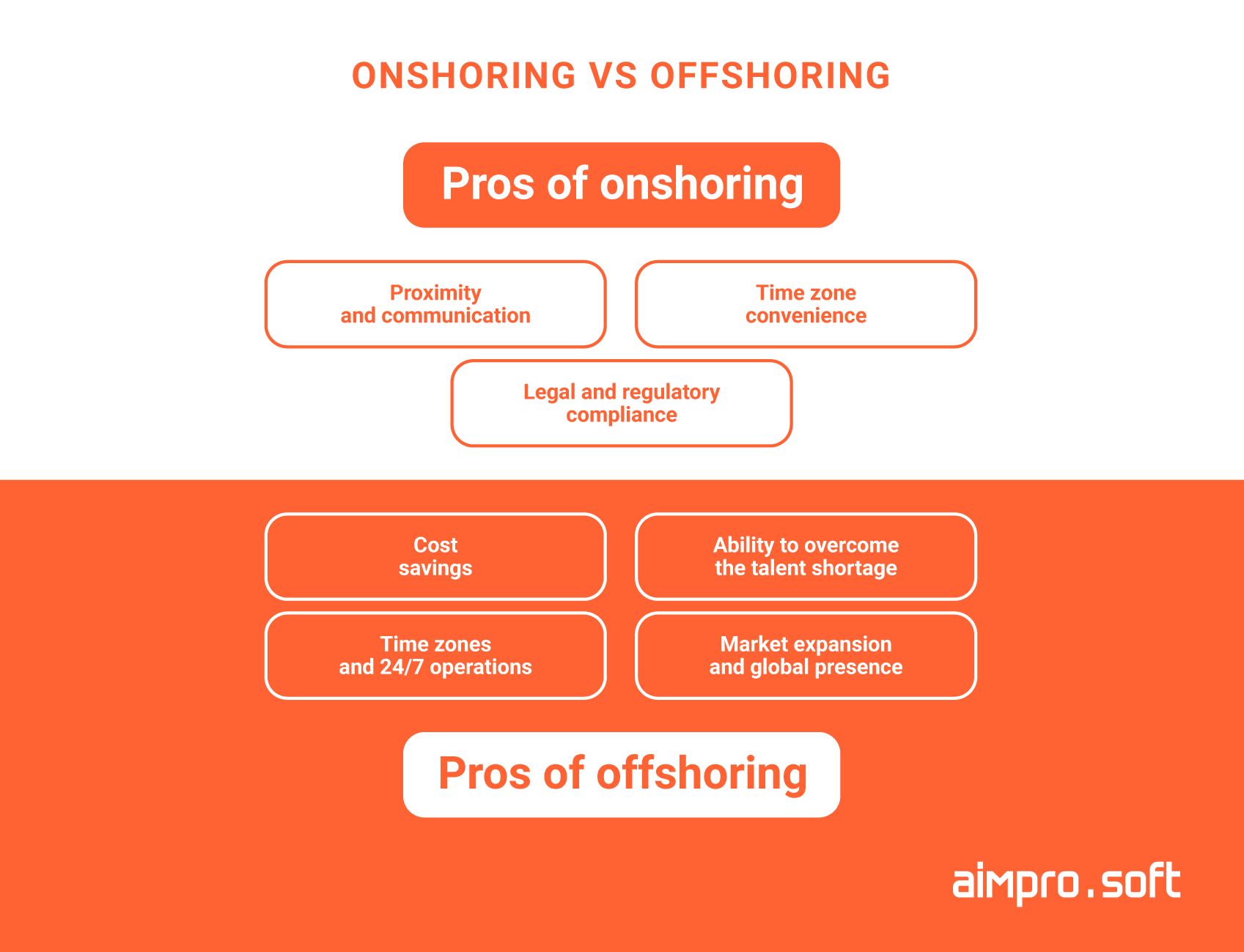
Onshoring vs offshoring
Onshoring
Onshoring, also known as internal outsourcing, in this collaborative model, the work process is transferred to third-party providers located within the country, or the development process is outsourced to a neighboring region. Unlike offshoring, in which tasks are outsourced to a distant foreign company.
Benefits of onshoring:
Proximity and communication
Onshoring allows for more accessible and direct communication with the service provider because they are in the same country. This proximity facilitates real-time collaboration, reducing communication barriers and possible miscommunication.
Time zone convenience
With onshoring, there is little or no time difference, making project coordination and updates smoother, especially for real-time projects and urgent requirements.
Legal and regulatory compliance
Onshore companies operate within the same legal framework, adhering to local regulations and standards, simplifying compliance, and minimizing potential risks.
Cons of onshoring
Limited talent pool
Depending on location, onshoring may limit access to the specialized talent available in offshore markets. Finding specialists in niche technologies or industries can be more challenging.
Talent Competition
In the local market, competition for high-caliber talent can be fierce, leading to delays in hiring and resource allocation.
Offshoring
involves moving certain activities or processes to another country. It consists in crossing geographical boundaries and moving operations to countries where labor costs may be lower and offer good value for money or where the talent pool may be broader. Offshoring often includes an element of outsourcing, as tasks or services are delegated to an external provider offshore.
Pros of offshoring:
Cost savings
Offshoring can provide significant cost savings, especially when moving production to countries with lower IT services costs. This can be beneficial, especially for labor-intensive tasks or long-term collaborations.
Ability to overcome talent shortage
Offshoring allows you to expand your talent pool by gaining access to skilled professionals worldwide. This can be particularly valuable when looking for specialized expertise or niche skills that may be in short supply in the local market. Many startups resort to offshoring out of an impulse to find specialists in another region, as there may be a talent shortage in their area.
Time zones and 24/7 operations
Offshoring to locations with different time zones allows businesses to establish round-the-clock operations. By leveraging the time difference, tasks and projects can progress even when the home team is offline. This can lead to faster turnaround times, increased productivity, and improved customer responsiveness.
Market expansion and global presence
Offshoring can be a stepping stone to entering new markets and expanding a global presence. An offshore presence allows companies to understand local markets better, gain insights, and partner with local organizations. This can increase market share and improve competitiveness.
Cons of offshoring
Quality control
Maintaining consistent quality in geographically distributed teams can be more challenging. Ensuring that all team members adhere to the same standards and processes may require additional effort and resources.
Intellectual property protection
Offshoring to countries with weaker intellectual property laws can raise concerns about protecting confidential information and proprietary technologies. But such concerns are beginning to disappear in today’s world, as most popular outsourcing destinations adhere to international data protection regulations.
Overall, both offshoring and onshoring offer valuable advantages to businesses. Offshoring primarily provides access to a diverse talent pool, cost savings, and the ability to work around the clock. Onshoring offers advantages in terms of communication and legal compliance, making it a favorable option for businesses looking to outsource while maintaining a close working relationship within their own country. The choice between offshoring and onshoring depends on the specific needs and goals of the business, so each option is valuable and strategic for productivity and growth.
A step-by-step guide to choosing the right SaaS development services provider
Following a particular number of actions when choosing a reliable SaaS vendor, you can mitigate risks and select a reliable partner that meets your requirements. The following steps provide a structured guide to help you make an informed decision. Let’s examine each of them in detail.
Step 1: Define your requirements
The hard facts are that success is “unlikely” for 68% of technology projects. The reason for that is due to poor requirements analysis and documentation. You have to clearly establish your project requirements before looking for a SaaS app development company. Consider required functionality, scalability, security measures, integration needs, and domain-specific requirements. By clearly understanding your needs, you can effectively assess whether a potential development company can meet them.
This is necessary to ensure communication and alignment between your expectations and the development company’s capabilities. Neglecting this important step can lead to wasted time, budget overruns, and delays, which can be detrimental to your business and ultimately even lead to project failure.
All the necessary project requirements could be documented with the help of the Discovery Stage if they were not clear initially. Learn more about the importance of this stage in our article on the topic
Step 2: Research and shortlist companies
Conduct thorough research to identify a range of potential SaaS development companies. Look for companies with a good reputation, positive customer reviews, and a track record of successful SaaS projects. Consider factors such as industry experience, qualifications, and the company’s overall reliability.
A lack of proper research can lead to working with an inexperienced or unreliable company. Which will only be able to meet some of your requirements, and you will not be satisfied with the result. To ensure the company’s reliability, you can study potential companies’ profiles on independent review platforms, such as TechBehemoths, Clutch, and GoodFirms.
Step 3: Examine the portfolio and case studies
Examine the portfolio and case studies of SaaS application development companies to evaluate their past projects and their relevance to your industry, product complexity, and desired outcomes. Look for projects that demonstrate the company’s ability to build high-quality, scalable, and user-friendly SaaS applications.
If you don’t examine the portfolio and case studies, you could select a company without relevant experience or a proven track record. This increases the risk of project failure and a mismatch between your expectations and the developer’s capabilities.
Step 4: Consider their working experience with cloud
Experienced SaaS vendors with a deep understanding of cloud computing platforms can significantly expedite SaaS development. These top-notch companies should have in-depth familiarity with cloud platforms like GCP and AWS, leveraging their capabilities to tailor solutions to your needs. Depending on your SaaS project requirements, a skilled SaaS application development company should know how to utilize different cloud platforms. For instance:
- If your project primarily requires cloud infrastructure like servers, networking, and storage, an IaaS (Infrastructure-as-a-Service) platform is suitable.
- For web app development, focusing on coding, testing, and data, a PaaS (Platform-as-a-Service) platform is the ideal choice.
- And if you need a cloud platform to host your mobile back-end, an MBaaS (Mobile-Backend-as-a-Service) platform comes into play.
This ensures they possess a comprehensive understanding of multi-tenant architectures and can navigate diverse cloud options, crafting a robust and scalable SaaS solution tailored to your business needs.
Step 5: Assess the potential for long-term partnerships
Assess the company’s ability to establish a long-term partnership. Look for companies that offer ongoing product maintenance and functionality expansion services. Consider their commitment to staying abreast of emerging technologies and industry trends and their desire to help your business grow.
Failing to consider the potential for a long-term relationship can lead to difficulties in meeting future needs, upgrades, and modernization.
Armed with the advice, you are more likely to find a reliable SaaS provider. But in addition to the above steps, you need to decide exactly how you want to hire a SaaS provider. Below we will discuss and compare the two most popular options: offshoring and outsourcing.
Important steps to take before contacting a SaaS provider
Once you choose the best-fit candidate, it’s time to take certain measures to make your partnership fruitful and challenge-free. Below we have outlined steps to follow before you approach a SaaS company to design your solution.
Step № 1 Decide the SaaS application development services that you need
Determine the scope of services required from the development company. Whether it’s end-to-end SaaS application development, maintenance, upgrades, or specific development phases such as design, development, or testing, defining the services required will allow you to find a company with the necessary expertise to meet your needs.
Step № 2 Define the budget for your SaaS product
Define a clear and realistic budget for your SaaS project. Consider the costs associated with development, deployment, ongoing maintenance, and possible upgrades. Determining a budget will help you find a development company that will meet your financial constraints while delivering quality results. To better understand the budget required to develop your SaaS solution, you can conduct thorough research on similar SaaS products in your industry to analyze pricing, features, and functionality.
Also, clearly define the scope of the SaaS product and the specific features to be included. A clearly defined project scope and scale allows you to accurately estimate development costs and avoid unnecessary expenditures.
Contact us, and we will conduct a discovery stage for you, where the product’s estimate is determined.
CONTACT USStep № 3 Security expertise assessment
Information security is critical for SaaS applications that handle sensitive data. Evaluate the security measures implemented by development companies to protect user information, prevent data breaches, and comply with relevant regulatory requirements. Choosing a company with significant experience in information security ensures data protection and builds user trust. What measures should your SaaS provider take to protect your data? For example, all code will be stored internally on company servers or within the VPN network.
Finally, every IT company should sign a non-disclosure agreement (NDA) with its customers. The information you wish to keep private and the repercussions of disclosing it must be clearly specified in this agreement.
Step № 4 Decide on a technology stack
Define the technology stack for your product. If you have done the first steps we described above, you probably have an idea of what technologies you need. Make sure that the vendor’s technology expertise matches the requirements and long-term goals of your project. IT vendors often leave information about their expertise on a page of their website, like Aimprosoft, for example. It is also possible to agree with the vendor and engage a software architect at the initial stages of project development to advise and select a technology stack based on the requirements and specifics of the project.
Not sure what tech stack will be right for your project? Read our article on the topic, where we share tips on choosing technologies and avoiding common mistakes.
Important questions to ask a potential SaaS vendor
When you are choosing a vendor, in addition to the general criteria of a shortlisted candidate, you need to clarify a number of important questions before starting a partnership. This section provides a list of the essential questions to ask a potential SaaS software vendor and serves as a critical tool for understanding the vendor’s processes, abilities, and compatibility with your project’s needs.
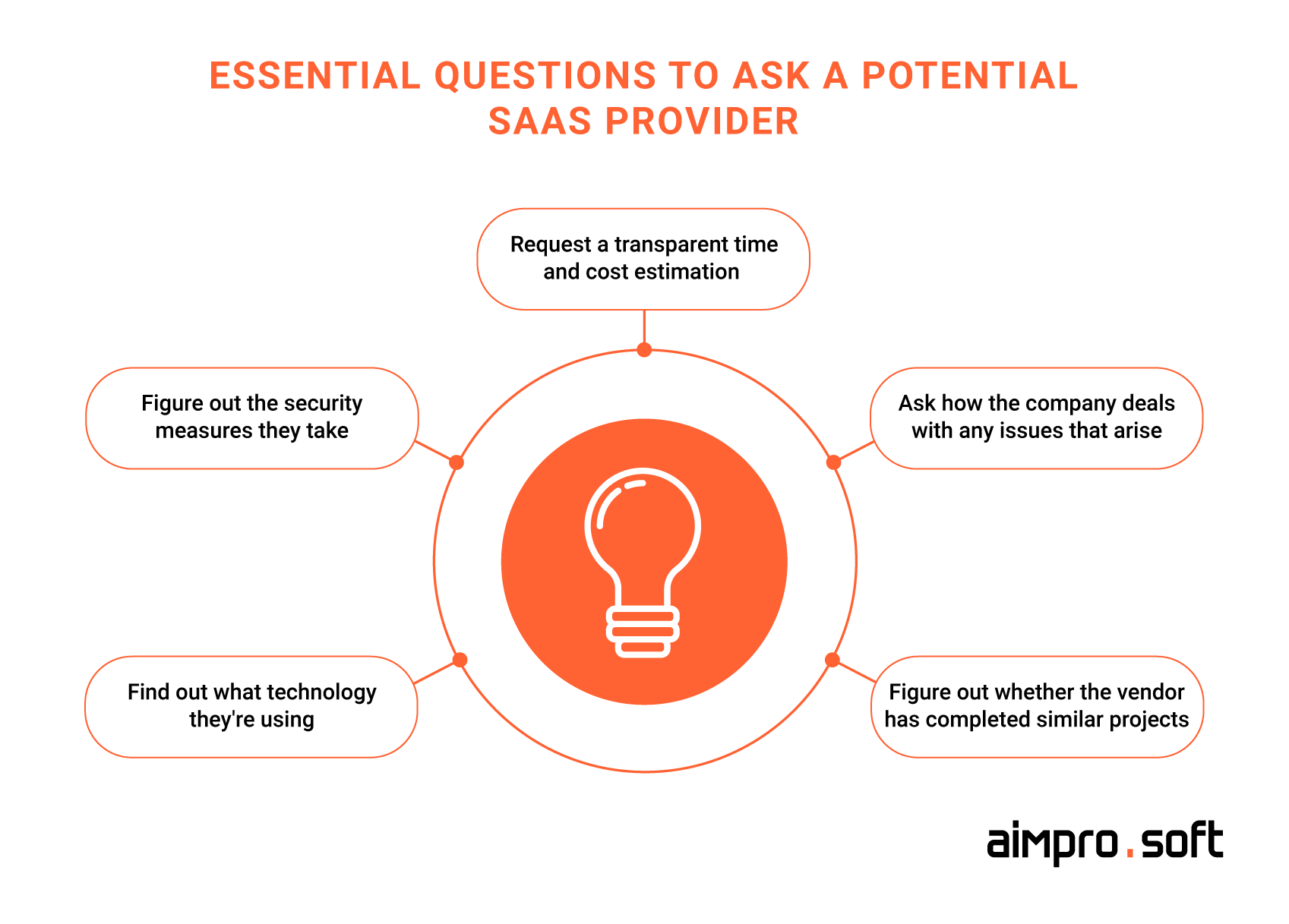
Essential questions to ask a potential SaaS provide
1. Request a transparent time and cost estimation
Asking about time and cost estimation is one of the most important questions when interviewing your potential vendor. Although some vendors may list prices on their websites, they are most often approximate because each project is unique and requires an estimate. SaaS software development company can calculate an estimate for your project, and only then can you make an accurate decision.
What factors affect the cost of developing a SaaS product?
- Scope and complexity of a project
- Development duration
- Developers’ hourly rate
- Customization
- Testing
- Support and maintenance
2. Ask a question about data security
The question of data protection is of paramount importance in the interview with the provider. Protecting sensitive user information and preventing data breaches is essential to maintaining trust between you and your client. After such a question, you should be told about your comprehensive approach to data protection, including encryption measures, access controls, and secure storage protocols. Every IT service provider should comply with industry standards and regulatory requirements, such as GDPR, HIPAA, and PCI DSS that vary depending on your industry. A reliable provider will assure you that data security is a top priority throughout development.
3. What happens when challenges arise?
The question allows you to assess the provider’s preparedness for and ability to respond to unforeseen scenarios, ensuring continuity of service and minimal disruption to users. The provider must demonstrate its emergency response plan and protocols. It should describe the actions taken to address different types of emergencies, such as server outages, data breaches, or cyberattacks.
4. What kind of technology are you using?
It is important that the provider has experience with the technologies that are often used in the development of SaaS solutions. Ask what technologies saas software developers use when creating projects. Most often, the list of such technologies looks like this: Java, Angular.js, React.js, Vue.js, Node.js, React Native, Python, PHP, Microsoft Azure and AWS.
Nevertheless, the vendor’s software architect can also advise you and suggest the most suitable stack depending on your request and product specifics.
5. Have you developed solutions similar to my product?
Such a question allows you to determine their relevant knowledge and experience with projects similar to yours. A vendor who has experience with similar solutions is more likely to understand the specifics of your needs, technologies, and challenges, leading to a smoother and more successful SaaS development process. You can always ask the vendor to showcase a portfolio of their projects, emphasizing those closely related to your product’s solution type.
Asking the right questions is the first step in ensuring a successful partnership. We have shared with you some of the most critical questions that we, as a provider, are most often asked by our customers when they contact us. With this knowledge, you can confidently choose the right SaaS provider for your needs and begin the fruitful journey to creating a first-class SaaS product.
The power of effective communication during the development process
Communication
Effective communication is crucial for the success of a future SaaS product. It involves frequent discussions with the development team to shape the product according to your needs. For example, Forbes states that poor communication is still a major factor in project failure and hasn’t changed in over ten years.
When selecting a SaaS product development company, prioritize those with streamlined communication processes. Regular retrospective meetings, day-to-day follow-ups, and a centralized messaging tool for project-related discussions are essential.
Regardless of the project management tool used, ensure you receive daily standups, progress reports, and access to a transparent task-tracking system. These practices facilitate seamless collaboration, transparency, and timely updates, enhancing the chances of successful product delivery.
Additionally, fostering a culture of open communication and encouraging client feedback throughout the development journey can lead to better understanding and alignment with project goals. This client-centric approach ensures the end product meets or exceeds expectations, resulting in a satisfied user base and increased product success.
Check the project management capabilities
When looking for a top-notch SaaS app development company, evaluating their project management capabilities is essential. Effective communication, collaboration tools, and proactive risk management are all necessary to keep the project on track. Choose a partner that values your input and turns SaaS development into one well-oiled machine.
How a reliable vendor should manage a project
- Project tracking: Look for a company that offers a robust project-tracking system. This should provide clear insights into task status, timelines, and overall progress.
- Collaboration tools: Check whether they use efficient collaboration tools (e.g., Slack, Jira) to enhance team communication and facilitate seamless collaboration.
- Risk management: Inquire about their risk management strategies. A competent company should proactively identify and address potential risks that could impact project timelines or quality.
- Client involvement: Ensure they value your involvement throughout the development process. Your input and feedback should be actively sought and incorporated into decision-making.
Effective project tracking ensures transparency and timeliness of project delivery. Proactive risk management reduces project disruption, and client involvement ensures that the end product meets expectations. If a company doesn’t manage a project properly, it can lead to misunderstandings, delays, and unsatisfactory results, whereas compliance contributes to success and customer satisfaction.
Do you want to learn more about managing a remote team and the communication measures a provider should take? Read our article with useful tips on this topic.
Team structure and work methodology
A crucial aspect of creating a successful SaaS product is the software development methodology used by the vendor. It governs how the vendor manages time, labor resources and addresses the challenges of scaling and adaptation during the development process. Choosing the right methodology ensures efficient resource allocation, seamless scalability, and the ability to adapt to changing requirements, leading to a well-built and successful SaaS product.
Here are some examples of development methodologies:
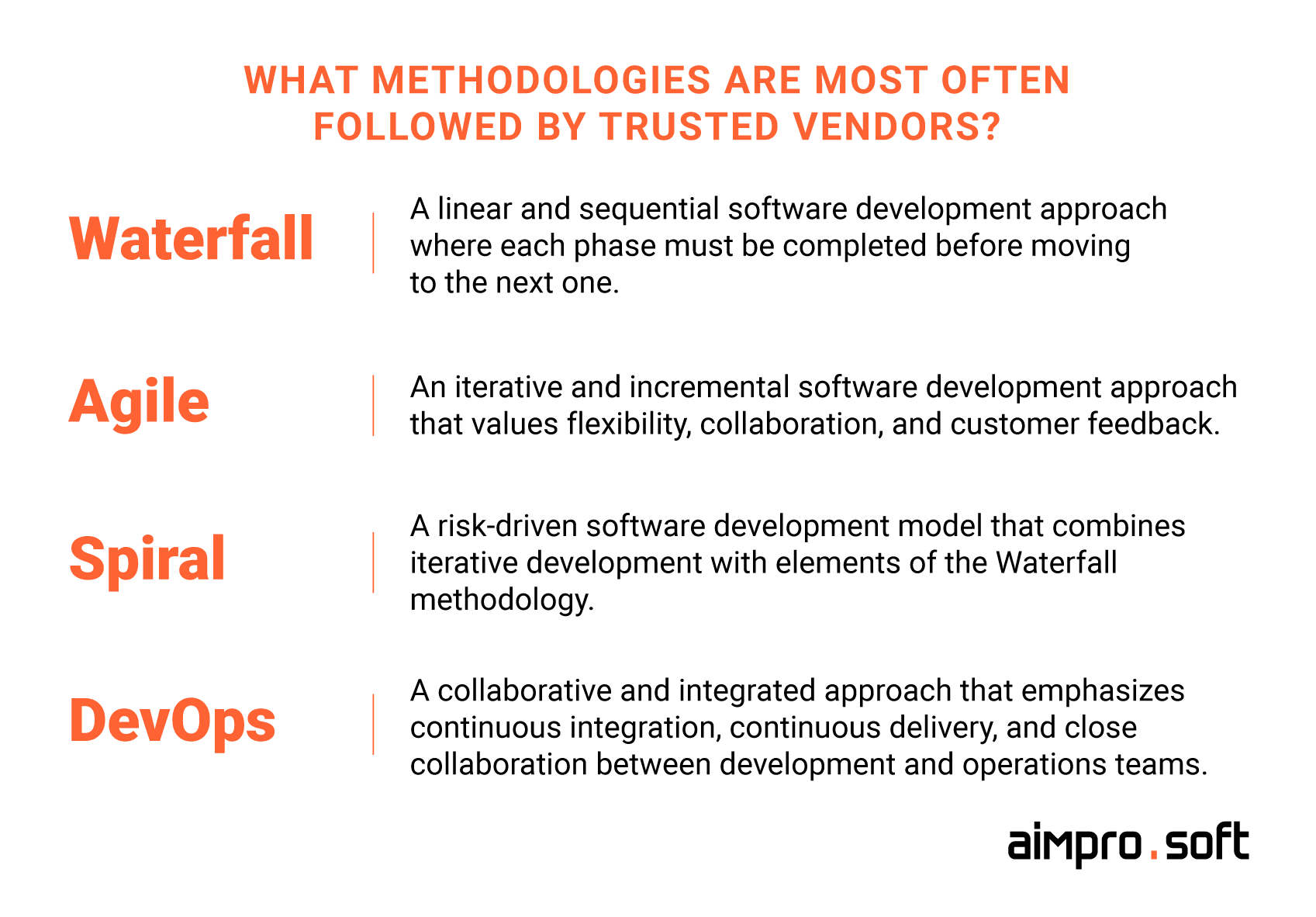
Most often followed methodologies
Waterfall
The Waterfall methodology follows a linear and sequential approach. Each phase of the development process, such as requirements gathering, design, development, testing, and deployment, is completed before moving on to the next step. Changes take time to accommodate once a phase is completed.
Agile
Agile methodologies like Scrum and Kanban focus on iterative and incremental development. They prioritize collaboration, adaptability, and customer feedback. Agile teams work in short cycles called sprints to deliver small, functional increments of the software.
Spiral
The Spiral methodology combines iterative development with risk management. It involves repeated cycles of prototyping, risk analysis, and development, with each cycle building on the knowledge gained from the previous ones.
DevOps
DevOps is a software development methodology that emphasizes collaboration between development and operations teams. It focuses on automation, continuous integration, and delivery to streamline the development process, leading to faster time-to-market, improved reliability, and a better customer experience.
A well-defined methodology ensures effective project management, transparency, and adaptability to change. In addition, methodologies such as Agile can reduce time-to-market, improve team collaboration and provide continuous feedback to the customer. The company’s use of a competent methodology ensures structured and efficient work, which leads to successful project implementation and the creation of a high-quality SaaS product that meets business goals and user needs.
Assessing сompanies with a business-oriented focus
In the fast-paced world of SaaS development, the key to success in the market lies in finding a development company that truly understands and addresses the business needs of its customers. Beyond technical expertise, business focus is becoming a driving force in creating SaaS products that can thrive in a competitive environment. The ideal SaaS application development company that truly understands the business needs of its customers can deliver such kind of services that will ensure the success of a future SaaS product in the market:
Discovery stage: A business-oriented company should have the skills to carry out this stage. It involves an in-depth study of the target audience and market needs. During this process, the company gets a deep understanding of the purpose of the product and builds a development strategy accordingly.
Engaging business analysts: To bridge the gap between technical knowledge and business requirements, business analysts need to be involved. These experts translate business goals into actionable development plans, ensuring that the SaaS product is aligned with the long-term goals and needs of the customer’s market.
Quality assurance and testing: To avoid failure in the market, strict quality assurance and testing are essential. A business-focused company conducts comprehensive testing to identify and fix problems, ensuring a reliable, bug-free product.
Data-driven decision-making: The company makes informed decisions throughout the development process using analytical data. Data-driven strategies allow for product improvement and alignment with the ever-changing market.
By taking these steps, the SaaS development company ensures the product’s future success in the market. Through customer-centric collaboration, strategic planning, and steadfast adherence to business objectives, the company is able to create SaaS application that meets the needs of both the customer and end-users.
Why choose Aimprsoft as your SaaS provider?
Aimprosoft is always ready to offer our expertise if you want to develop your own SaaS application. With more than 18 years of experience in the IT industry, we have successfully completed more than 600 projects and earned a reputation as a reliable software provider.
We have given you the criteria that a credible SaaS provider should fulfill, ranging from being well-established in the market to having expertise in certain technologies. We meet all the criteria, and here are a few facts to prove it:
- We are well-rated and have positive customer reviews on trusted platforms such as TechBehemoths, Clutch and GoodFirms.
- We have experience in 16+ domains, including education, e-commerce, healthcare, real estate, retail, telecom, and IoT.
- With a team of more than 350 highly skilled IT specialists, we offer the flexibility to assemble a dedicated team tailored to your specific product requirements.
- Over the years, we have built up a solid portfolio of SaaS and other cloud solutions
- We have extensive experience with commonly used technologies for SaaS solutions, including Java, Angular.js, React.js, Vue.js, Node.js, and React Native.
Our strong security measures
We have implemented a comprehensive strategy in our quest for internal security compliance. Our SaaS developers use security methods such as hard drive encryption, and enforcing strong passwords across all devices handling sensitive information. For external users, a secure VPN ensures protected access.
We have deployed malicious application detection systems for virtual infrastructure nodes to fortify our defenses. Regularly updating security patches is a top priority, and we employ intrusion detection and prevention systems as added layers of protection. Additionally, we leverage cloud services to safeguard your source code. Access to this critical data is strictly controlled and restricted, ensuring the utmost security at all times.
A SaaS project from our portfolio ㅡ KubKaf
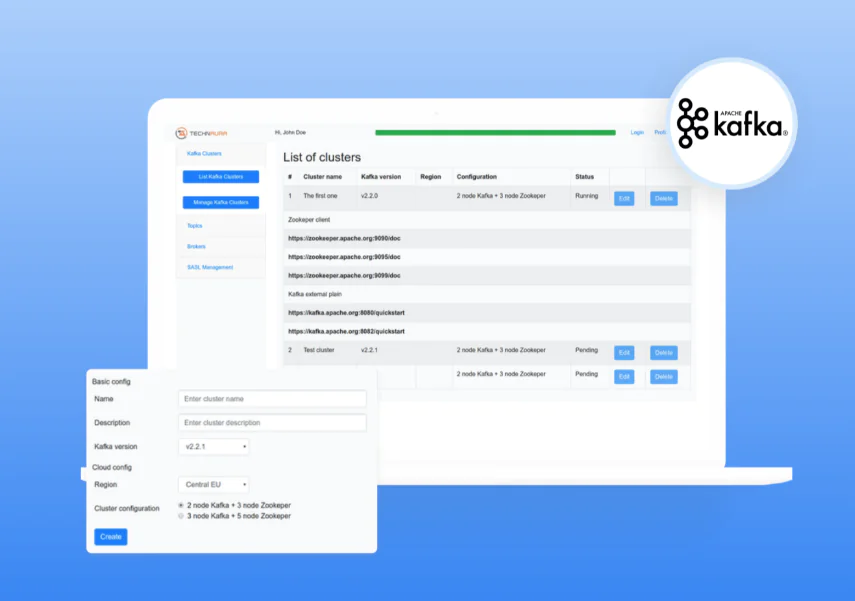
KubKaf interface
KubKaf is a game-changing product that simplifies cluster management. Our scalable and fault-tolerant solution provides users with a seamless experience.
Problem: The client approached us with one idea – to build a new, cutting-edge solution from scratch, namely a SaaS platform that would assist users, independently of their tech skills, with the deployment and maintenance workflows of Kafka and provide a simplified way to build a cluster without deep customization.
Solution: Our team successfully developed a highly efficient, fault-tolerant solution to meet these requirements. Leveraging the power of Kafka as a reliable message broker and event storage, along with the capabilities of Scala technologies, we implemented a robust set of microservices. These services addressed various cluster, user, profile, and account management challenges.
Conclusion
Navigating the vast pool of SaaS development companies can be challenging, given the many options available. With this article, we wanted to arm you with essential information to make an informed decision. We hope our advice has shed light on the most critical factors, from understanding the project requirements to assessing the project management experience and technologies that a SaaS company should have experience with. In this teeming realm of technology, choosing the right provider will help propel your SaaS project forward, leaving an indelible mark on the competitive market.
You can always turn to us if you are looking for a trusted IT company that specializes in the development of SaaS projects. Our experts will be able to dispel all your concerns on the way to the successful creation of your product, and together we will find the best solution for you, meeting your technical and business requirements.
FAQ
How secure are SaaS applications?
SaaS applications prioritize security with measures like encryption, access controls, and regular updates to protect user data. Additionally, reputable SaaS development companies follow industry best practices to ensure a robust security framework.
How much will it cost to develop a SaaS application?
SaaS application development costs vary based on factors like project complexity, features, and customization requirements. To get an accurate estimate, requesting a detailed quote from the SaaS development company is recommended, considering your specific needs and goals.
Will I own the code for the developed SaaS product?
Yes, you should retain full ownership of the code and intellectual property rights once the SaaS product is developed. Ensure that the contract clearly outlines the ownership terms to avoid any misunderstandings.
How does the company handle intellectual property rights and ownership of the developed software?
A trustworthy SaaS development company ensures that you retain complete ownership of the intellectual property rights for the developed software. They should address this clearly in the contract to protect your interests.
Can you provide ongoing support and maintenance for the SaaS solution after it’s launched?
Yes, reputable SaaS development companies often offer ongoing support and maintenance services to ensure the smooth operation of your SaaS solution post-launch. This ensures that issues are promptly addressed, and the software remains up-to-date and efficient.
How can I assess the experience and expertise of a SaaS development company?
Assess the company’s experience and expertise by reviewing their portfolio, client testimonials, and case studies showcasing successful SaaS projects. Additionally, seek out their track record in delivering similar solutions to gauge their capabilities. Engaging in direct communication with the company and discussing your project in detail can also provide valuable insights into their proficiency and suitability for your needs.
Can the SaaS development company assist with integration and migration from existing systems?
A capable SaaS development company should be able to offer expertise in both integration and migration, ensuring that your new SaaS application works harmoniously with your existing systems without disrupting essential workflows. This capability is crucial to avoid data loss, minimize downtime, and optimize the overall efficiency of your business operations.
What makes Aimprosoft different from others in providing SaaS services?
In addition to our strong technical expertise in developing SaaS solutions, we have many specialists on board to ensure competent project management and monitor the business value of your project. We are also very flexible and always ready to adapt to the client’s needs and requirements to reach a perfect understanding.




